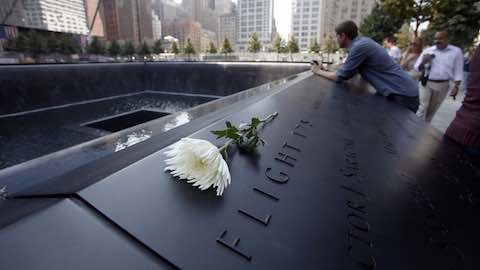
Remembering 9/11: Unity Is Just a Memory
By Clarence Page
In response to its horrors, September 11 brought a reassuring surge in national pride and self-sacrifice. Unfortunately, our national unity faded for a number of well-known reasons
If we had another terrorist attack like
That question came to mind as
It's all part of a weekend of observances in
It is widely believed that the jetliner was headed for the U.S. Capitol after being hijacked by terrorists, House Speaker
Thanks for the memories. In response to its horrors,
Nothing concentrates the mind, I reflected at the time, like the knowledge that somebody's out to kill you simply for being American.
A "new normal" settled in. Civilian vigilance and courage back home paid off in the foiled efforts of the "shoe bomber"
I'd like to think that, for all their Obama vs.
Unfortunately, our national unity faded for a number of well-known reasons. The goals and strategies of Bush's "global war on terror" became less clear and more questionable. Voices on the right and left increasingly questioned the government's new intrusions on privacy allowed by the hastily passed PATRIOT Act. The
The last of the administration's post-9/11 political capital was spent on a shift of our forces to a new war against
Today, political cooperation in
Polls reveal a public taking out its rage on the usual suspects: whoever is now holding office, including President Obama. More than 60 percent of those asked in a new
His high marks? More than 60 percent approve of his success against the threat of terrorism. The killing of
Obama's meager consolation: He doesn't look much worse than his opponents. He still polled a couple of points better in the survey than the job performance of Republicans in
Senate Minority Leader
WORLD | AFRICA | ASIA | EUROPE | LATIN AMERICA | MIDDLE EAST | UNITED STATES
More United States News & Analysis ...
- Remembering the September 11th Attacks
- September 11th Remembered on Video
- 9/11 Prayer and Remembrance
- The Legacy of 9/11
- Did 9/11 Weaken or Strengthen the United States?
- 9/11 in Retrospect: George W. Bush's Grand Strategy, Reconsidered
- Ian Williams' Lost 9/11 Chronicle
- Remembering 9/11: The Day That Changed Us
- Remembering 9/11: After the Terror, We Move Forward
- Remembering 9/11: The Successful War
- Remembering 9/11: Reasons to Remember
- Remembering 9/11: Unity Is Just a Memory
- Remembering 9/11: Myth and Reality After 9/11
- Remembering 9/11: Captives to the Logic of Violence
- Remembering 9/11: Bin Laden's Unintended Legacy
- Remembering 9/11: From Empire to Decline
- Remembering 9/11: Rethink Needed
- Remembering 9/11: Why Al Qaeda is Unlikely to Execute Another 9/11
- Remembering 9/11: Al-Qaeda Lost the Battle Long Ago
- Remembering 9/11: Years of Wars is Enough
- Remembering 9/11: Scanning Bodies, Stripping Rights?
- Remembering 9/11: NATO's Future Remains Uncertain
- Remembering 9/11: Wave of Islamophobia
WORLD | AFRICA | ASIA | EUROPE | LATIN AMERICA | MIDDLE EAST | UNITED STATES
"Remembering 9/11: Unity Is Just a Memory "
|
|
|